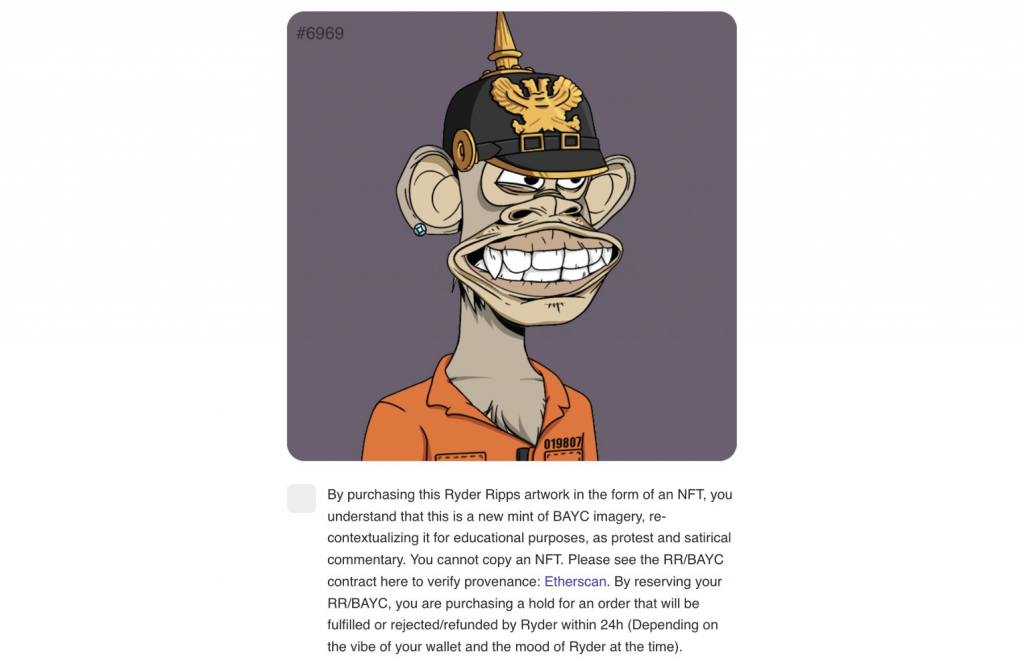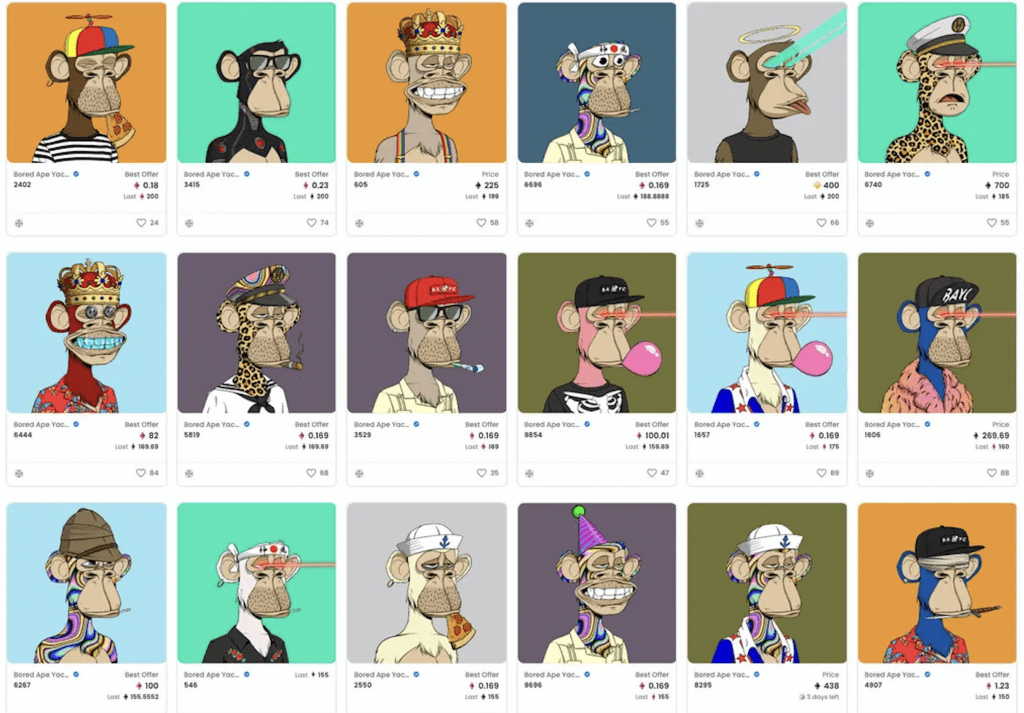A new trademark lawsuit over non-fungible tokens (“NFTs”) pits Yuga Labs, the maker of the popular Bored Ape Yacht Club (“BAYC”) tokens, against a group of defendants, including artist Ryder Ripps, that is allegedly “trolling Yuga Labs and scamming consumers into purchasing RR/BAYC NFTs by misusing Yuga Labs’ trademarks.” In the complaint that it filed in a California federal court on June 24, Yuga Labs claims that Ripps, Jeremy Cahen, and a number of other affiliated defendants are on the hook for trademark infringement, false designation of origin, cybersquatting, and conversion for creating and selling NFTs that bear “the very same trademarks that Yuga Labs uses to promote and sell authentic BAYC NFTs.”
According to newly-initiated lawsuit, Yuga Labs asserts that it began using various trademarks, including the BAYC name and various logos, back in April 2021. The project – which consists of 10,000 NFTs tied to illustrations of bored-looking apes – has since ballooned into a multi-billion-dollar venture, with the NFTs “often resell[ing] for hundreds of thousands, if not millions, of dollars,” per Yuga, and thousands of individuals, including famous figures like Jimmy Fallon, Justin Bieber, Madonna, Snoop Dogg, Eminem, Steph Curry, Serena Williams, and Shaquille O’Neal, acquiring the buzzy digital tokens and often displaying them on their social media accounts.
In response to BAYC’s popularity, Miami-based Yuga alleges that in May 2022, Ryder Ripps started making “exact replicas” of Yuga Labs’ Bored Ape NFTs and using BAYC trademarks in connection with his marketing and sale of the allegedly infringing NFTs. In addition to using “the very same marks to promote their RR/BAYC NFT collection,” Yuga argues that Ripps has offered up the allegedly infringing NFTs on “the same NFT marketplaces that Yuga Labs uses to sell its Bored Ape NFTs, such as OpenSea,” which amounts to “elementary level trademark infringement: [the defendants] are selling the same or related products, in the same place, under the same marks.”

Still yet, Yuga contends that Ripps and co. have “repeatedly misrepresent[ed] the nature of the RR/BAYC NFTs,” including by “equat[ing] buying a RR/BAYC NFT with buying an official BAYC NFT.” The two parties’ NFTs may look the same, but Yuga states that “the holder of an authentic Bored Ape NFT has commercial rights to the associated digital art that are not acquired by the purchaser of a RR/BAYC NFT,” while the RR/BAYC NFTs “do not offer the same exclusive access to the Bored Ape Yacht Club and other services that authentic Bored Ape NFTs offer, nor do they carry the same value.”
In furtherance of his alleged quest to “devalue the Bored Ape NFTs by flooding the NFT market with his own copycat NFT collection using the original Bored Ape Yacht Club images and calling his NFTs ‘RR/BAYC’ NFTs,” Yuga Labs alleges that Ripps has reaped “millions of ill-gotten profits from these sales” (an estimated $5 million), all while simultaneously using its trademarks to promote “the imminent launch of an entire NFT marketplace called ‘Ape Market’ solely to sell the RR/BAYC NFTs alongside authentic Yuga Labs NFTs.” And still yet, Yuga asserts that in addition to promoting the RR/BAYC NFTs and Ape Market on social media, Ripps is “using his social media presence … [to] target Yuga Labs in a campaign of harassment based on false accusations of racism” and to successfully “fuel sales of the fake RR/BAYC NFTs.”
Before setting out its causes of action, Yuga appears to try to get ahead of any fair use defenses that counsel for Ripps will inevitably lodge in response to the new lawsuit, stating that the defendants’ website (https://rrbayc.com) “claims that minting exact replicas of Yuga Labs’ Bored Ape NFTs and reselling them at a profit is ‘satire.’” (Ahead of purchasing a RR/BAYC NFT, buyers agreed to terms on Ripps’ site that read, “By purchasing Ryder Ripps artwork in the form of an NFT, you understand that it is a new mint of BAYC imagery, re-contextualizing it for educational purposes, as protest and satirical commentary.”)

In reality, Yuga argues that the defendants’ unauthorized use of the BAYC marks – which is “likely to cause consumers to be confused as to the source, nature, and quality of the services [they] are promoting or selling” – is part of “a longstanding harassment campaign against Yuga Labs and an attempt to devalue the price of authentic Bored Ape NFTs.” The bottom line, per Yuga: “Copying is not satire, it is theft. And lying to consumers is not conceptual art, it is deception.”
(Counsel for Ripps may also argue (to what level of success, I am not sure) that the likelihood of confusion here is lessened given that Ripps consistently labels his offerings as RR/BAYC or Rider Ripps Bored Ape Yacht Club, thereby, distinguishing his NFTs from Yuga’s BAYC offerings. This very well may be supported by the “degree of consumer care” factor in the Sleekcraft likelihood of confusion test, as chances are, buyers of NFTs are a relatively small group of sophisticated buyers capable of distinguishing between one project and another. It is worth noting that courts have held that consumers in the market for expensive products online are more sophisticated/exercise a certain degree of care. Confusion may still exist, but as the Ninth Circuit held in Multi Time Mach., Inc. v. Amazon.com, “Confusion is less likely where buyers exercise care and precision in their purchases, such as for expensive or sophisticated items.”)
With the foregoing in mind, Yuga sets out claims of common law trademark infringement (as its long list of BAYC-centric trademark applications are still pending before the U.S. Patent and Trademark Office), false designation of origin and false advertising under the Lanham Act, cybersquatting, conversion, unjust enrichment, violations of California Business and Professions Code, intentional interference with prospective economic advantage, and negligent interference with prospective economic advantage. (Note: Yuga does not have any copyright registrations for its ape images and does claim copyright infringement in its complaint.) It is seeking injunctive relief to permanently bar the defendants from using “the BAYC marks, or any name, mark or domain name that wholly incorporates the BAYC marks or is confusingly similar to or a colorable imitation of these marks” in any manner, among other things, as well as monetary relief.
A READ BETWEEN THE LINES: Beyond the alleged potential for consumer confusion (which is at the core of any trademark infringement claim) about the source/nature of Ripps’ Bored Ape NFTs, what seems to be driving Yuga’s lawsuit is at least two-fold. In this case, rarity appears to be a key issue, with Yuga asserting that “aside from certain benefits that come with being a member of the exclusive community of Bored Ape NFT holders, much of this NFT collection’s value from the rarity” of the NFTs at play. “Only 10,000 Bored Ape NFTs exist, and each is entirely unique.” That uniqueness of the NFTs and thus, the appeal/value of the BAYC venture more broadly – which is likely central to the success of Yuga Labs as a whole, including its ApeCoin and Otherside platform – may be diminished by the presence of Ripps’ exact replicas in the market and the messaging that comes with such alleged satire-infused tokens. (In addition to claiming that the NFTs are soaked in Nazi tropes, Ripps has also argued that “Yuga is lying about IP rights and paying celebs to prop up their scam.”)
Second, there is the hard-to-ignore issue of Ripps’ extensive claims that the BAYC collection is rife with racist references and Nazi dog whistles, which Yuga is likely looking to shut down – even if it does not devote a significant amount of space to this in the complaint, aside from a few statements, such as, “Since early 2022, Ripps has harassed and personally attacked Yuga Labs and its founders through baseless accusations of racism over social media networks like Twitter and Instagram.” (Yuga almost certainly opts not to document Ripps’ racism/neo-Nazi allegations at length or with any specificity in an attempt to avoid further spreading of such alleged “misinformation.”)
Reflecting on the Bored Ape lawsuit, University of Kentucky Rosenberg College of Law intellectual property professor Brian Frye stated on Twitter that he suspects that what Yuga really wants is to get Ripps to “agree to stop criticizing them.” As for the effectiveness of this approach, Frye notes that he “fears the horse is out of the stable there, [as] if Ryder Ripps’ criticisms get traction, others are entitled to levy them, and Yuga risks a litigation ‘Streisand Effect’ amplifying Ryder Ripps’ message.” He notes that even if Yuga is unable to get the NFTs removed from the market entirely and cannot stop people from describing what RR/BAYC NFTs are, which would involve using Yuga marks (both of which seem like impossible outcomes), it can “stop Ryder Ripps from using BAYC marks to sell them” going forward by way of a permanent injunction.
Yuga has other potential remedies, as well. Neil Turkewitz, the President of Turkewitz Consulting Group and a former member of the Board of the Chamber of Commerce’s Global Intellectual Property Center, asserts that “the individual NFTs might not be recaptured, but OpenSea and other NFT exchanges could stop facilitating trade [of them],” which could have a significant, negative impact on demand for – and the value of – the RR/BAYC NFTs, “damages could be granted, etc.”
Ryder Ripps provided TFL with the following statement, “For the past seven months Yuga Labs has been actively trying to silence the research on gordongoner.com, as well as the thousands of people who take issue with several elements of their project, and this lawsuit is simply their latest attempt to do so. The lawsuit grossly mischaracterizes the RR/BAYC project – people who reserved an RR/BAYC NFT (Non Fungible Token) understood that their NFT was being minted as a protest against and parody of BAYC, and no one was under the impression that the RR/BAYC NFTs were substitutes for BAYC NFTs or would grant them access to Yuga’s club. They explicitly acknowledged a disclaimer when they purchased.
I have been creating NFT artwork for the past year that scrutinizes the purpose, meaning, and social import of NFTs, as numeric entries on distributed ledgers, not as the public images they link to. I am a passionate supporter of the principals of free speech and the blockchain. I believe the greatest purpose of NFTs is to establish provenance of digital content which previous to their advent was inherently difficult to trace the authorship and origins of.”
The case is Yuga Labs, Inc. v. Ryder Ripps, et al., 2:22-cv-04355 (C.D. Cal.)











